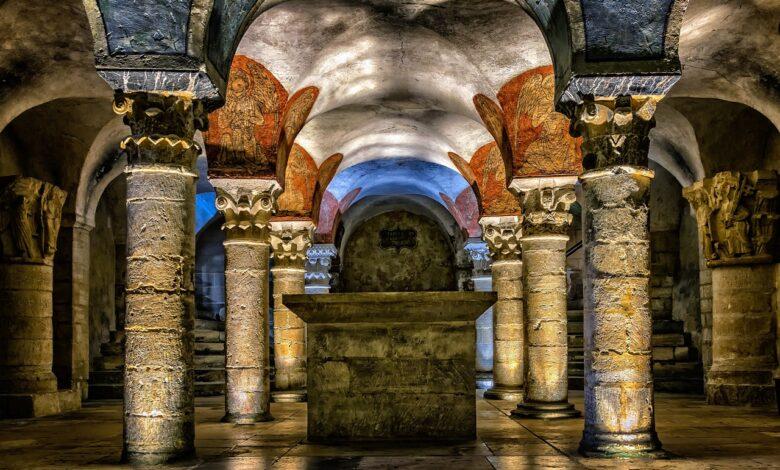Tomb Dream Meaning and Interpretation

Embarking on a journey through our subconscious, we often stumble upon perplexing symbols and scenarios, each bearing a unique message from the depths of our mind. Tomb dream meaning is particularly enchanting, encapsulating a myriad of emotions, symbols, and interpretations that span across diverse cultures and psychological perspectives. But what does it truly symbolize when we dream of tombs? Is it a mere manifestation of our fears or a subtle message shrouded in mystery? Let’s delve deeper into this intriguing topic, unraveling the various layers concealed within our tomb dreams.
Interpretations of Tomb Dreams
Embarking on the journey to decode the tomb dream meaning can be akin to navigating through a labyrinth of multifaceted symbols and emotions. The tomb, often a resting place yet mysteriously teeming with underlying connotations, emerges as a prominent symbol in our dreams, sparking curiosity and a myriad of interpretations in dream analysis. While tombs are fundamentally associated with death, their appearances in dreams are not merely restricted to symbolizing demise or negativity. Quite contrarily, they might bring forth an assortment of meanings, each enriched with its own unique symbolism and implications on the dreamer’s waking life.
- Association with Death and the Afterlife:
- A direct and quite literal interpretation, the tomb might act as a reflection of our fears or curiosity related to death and what lies beyond.
- It might embody a message from the departed or a means to establish a connection with the ancestral realm.
- Concealment and Secrets:
- Dreams of tombs may symbolize aspects of our life or personality that are concealed or repressed.
- These secrets might be personal or related to someone close, signifying that something needs to be unveiled or acknowledged.
- Endings and Beginnings:
- Tombs might symbolize an end, but every conclusion paves the way for a new chapter.
- It might imply a transformation, symbolizing that one phase of your life is ending, making way for a fresh start.
- Reflections on Loss and Grief:
- For those who have experienced the loss of a loved one, a tomb in a dream might personify their grief, loss, and the perpetual connection they maintain with those who have passed away.
- It might also imply a need to let go, to move forward without forgetting the cherished memories.
- Contemplation of Existential Questions:
- A philosophical interpretation might suggest the dreamer’s inherent ponderings on existential matters and life’s mysteries.
- It might mirror our inner contemplations regarding our existence, legacy, and the footprints we leave behind.
- Internal Conflict and Struggle:
Navigating through these interpretations requires a reflective lens, urging one to sift through their waking life’s experiences, emotions, and circumstantial nuances. The tomb dream meaning might differ vastly from one individual to another, for dreams are a deeply personal endeavor, often stitching symbols and messages that are tailored to our individual experiences, fears, desires, and emotions. Thus, peering into the depths of tomb dreams asks for a gentle exploration of our subconscious, where messages are often wrapped in enigmatic symbols, waiting to be unveiled by an intuitive heart and mind.
What is the Symbolism of Tomb?
Venturing into the symbolism of a tomb pulls us into a world where the tangible and ethereal intertwine, presenting not just a physical space but also a spiritual, psychological, and cultural metaphor that has permeated throughout centuries. When we delve into the realms of tomb symbolism, especially in dreams, we enter a space that resides between the conscious and the subconscious, linking our current experiences with age-old symbols that have been seeped into the collective unconscious.
- A Repository of Memories and Legacies:
- A tomb can serve as a silent keeper of memories, holding within its confines the stories, legacies, and remnants of those who have passed.
- It might mirror our desires to be remembered, our fears of being forgotten, or our reflections on how we will be commemorated.
- A Symbol of Finality and Eternity:
- Tombs, in their solemn stillness, symbolize a certain closure, an endpoint that can signify the end of a journey, a chapter, or a particular phase in life.
- At the same time, they carry the weight of eternity, reflecting our thoughts, beliefs, or fears regarding the perpetual and what follows the earthly existence.
- A Space Between Worlds:
- Often seen as the bridge between the physical and spiritual realms, a tomb might symbolize the transient nature of our existence, facilitating a communication channel or barrier between worlds.
- It could represent our struggles to connect, understand, or break free from spiritual connotations, seeking answers or escape from unanswered existential questions.
- Unearthed Secrets and Hidden Depths:
- A tomb could symbolize the things buried within us—secrets, unaddressed emotions, or unrevealed truths that are waiting to be discovered or are haunting our subconscious.
- It might resonate as a metaphor for our inner mysteries, aspects that we keep hidden from the world, or even from ourselves, asking for introspection and revelation.
- Transformation and Rebirth:
- Although closely associated with death, tombs also inherently carry the symbolism of rebirth or resurrection, reflecting cycles, renewals, and the endless flow of beginnings that sprout from endings.
- They may serve as a reminder or an urging from our subconscious that transformation is continual, urging us to embrace change, evolution, and the new opportunities that often blossom in the aftermath of closure.
- Safeguarding and Protection:
- Tombs often symbolize a safeguarding aspect, protecting not just the physical remains but also the spirit and memories from external disturbances.
- In dreams, they might mirror our own defense mechanisms, our attempts to protect ourselves, our loved ones, or our secrets from the external world, or perhaps our isolation and barriers erected due to past wounds.
The symbolism of a tomb, while multifaceted, always circles back to the dreamer’s personal nexus of emotions, beliefs, experiences, and perspectives. Hence, the interpretation becomes an intimate journey where the symbol of the tomb becomes a guide, nudging us to peer deeper into our inner worlds, exploring, acknowledging, and perhaps finding peace with the myriad of meanings it reflects within our dreams.
Common and Typical Dreams of Tomb
Embarking upon the eerie yet fascinating theme of tomb dreams, we find ourselves navigating through a spectrum of scenarios, each layered with its own unique textures of meanings, emotions, and reflections. The tomb, while universally symbolizing death and the final resting place, emanates a variety of themes in dreams, each providing distinct glimpses into our subconscious. To understand the tomb dream meaning more comprehensively, let’s unravel some of the common and typical tomb dream scenarios encountered by dreamers.
- Dreaming of One’s Own Tomb:
- Encountering your own tomb in a dream can be a jarring experience, inducing a cascade of thoughts and emotions.
- It may symbolize a transition or transformation in life, possibly indicating an end of a chapter and the beginning of another, or perhaps reflecting feelings of stagnation or entrapment.
- Visiting a Loved One’s Tomb:
- Such dreams might be an expression of grief, longing, or unresolved emotions related to the departed.
- It could also be a medium through which the subconscious is attempting to find closure or maintain a connection with the loved one.
- Discovering an Unknown or Abandoned Tomb:
- A metaphor for unearthing hidden secrets, revelations, or buried aspects of our self.
- It may also hint towards a curiosity or fear regarding the unknown and unexplored realms of our existence and consciousness.
- Being Trapped Inside a Tomb:
- A potent symbol of feeling confined, suffocated, or trapped in a situation or emotional state in waking life.
- Alternatively, it might denote a struggle to escape or deny certain inevitable truths or realities.
- An Empty Tomb or Disarranged Grave:
- Signifying a sense of loss, emptiness, or void that might be prevailing within the dreamer.
- It may also indicate surprises, unexpected turns, or revelations in waking life, urging one to be prepared for unforeseen developments.
- Witnessing a Tomb Being Built:
- Reflective of building or crafting one’s legacy, pondering upon the footprints left behind, or crafting a future path.
- It might also symbolize the formation of barriers, defenses, or emotional walls as protective or isolating mechanisms.
- Vandalizing or Desecrating a Tomb:
Navigating through these common tomb dream scenarios, it becomes pivotal to recognize that the symbolic expressions are deeply tethered to our personal tapestry of emotions, experiences, fears, and anticipations. The tomb, while encapsulating general symbols, becomes a mirror, reflecting our own idiosyncrasies, projecting messages and metaphors that are uniquely molded to guide, warn, or reflect our innermost layers.
Tomb-Related Dreams
Diving into the cavernous depths of tomb-related dreams unfolds a myriad of scenarios, each adorned with its own unique symbology and implications, weaving through the intricacies of our subconscious. Dreaming about tombs is not merely a black-and-white canvas of symbols but is often painted with vibrant strokes of various shades and nuances that cater to an individual’s experiences, emotions, and psychological states. Let’s explore some tomb-related dreams and attempt to unravel the threads of meanings intricately woven within them.
- Finding an Ancient or Hidden Tomb:
- This might symbolize the discovery of hidden aspects, secrets, or previously unknown facets within oneself or others.
- It may also suggest that the dreamer is uncovering ancient wisdom, connecting with ancestral roots, or discovering latent talents and abilities.
- Dreaming of a Tomb with Hieroglyphics or Symbols:
- Such dreams may symbolize a message or guidance from the subconscious or spiritual realms, especially if the dreamer is undergoing a period of uncertainty or seeking answers.
- It might also reflect a quest for understanding, decoding, or making sense of complex situations or emotions in waking life.
- Walking Through a Graveyard Towards a Specific Tomb:
- This could reflect a journey towards closure, understanding, or acceptance regarding a loss or an ended chapter in the dreamer’s life.
- Alternatively, it could symbolize a path that one is navigating in real life, reflecting the challenges, emotions, and experiences encountered on this journey.
- A Crumbling or Decaying Tomb:
- Dreaming of a deteriorating tomb might symbolize neglect, decay, or fading memories and legacies, urging the dreamer to rekindle, repair, or preserve them.
- It might also indicate the disintegration of barriers or walls that the dreamer has built, perhaps signaling a breakthrough or release.
- Illuminated or Radiant Tomb:
- A tomb bathed in light or possessing a supernatural radiance might symbolize divine intervention, spiritual messages, or enlightenment.
- It could also reflect clarity, acceptance, or finding peace with issues related to death, legacy, or the supernatural.
- Being Entombed or Witnessing a Burial:
- Such dreams might be potent symbols of entrapment, suffocation, or being buried under overwhelming emotions, responsibilities, or situations.
- Conversely, it might symbolize the entombment of aspects that need closure or a final goodbye to pave the way for renewal and rebirth.
- Seeing a Familiar Face in a Tomb:
- Witnessing a known person in a tomb might be an expression of fear of losing them or unresolved issues that linger between the dreamer and the person.
- Alternatively, it might symbolize aspects related to the person that are impacting the dreamer, such as their traits, experiences, or emotions that find a resonance within.
Embarking upon the interpretation of tomb-related dreams demands a sensitive and introspective approach, as the meanings often are embroidered with personal emotions, experiences, and psychological nuances. A tomb, while universal in its symbolic denotations of death and the afterlife, morphs its messages to align with the dreamer’s personal world, acting as a reflective pool that encompasses their unique emotional and psychological landscapes.
Psychological Perspectives
Exploring the psychological perspectives of tomb dreams guides us through a labyrinthine journey within our minds, where every turn, every symbol, and every emotion emanates a unique reflection of our inner psyche. “Tomb Dream Meaning” in the context of psychology doesn’t merely align with death but expands into territories exploring our perceptions, fears, transitions, and suppressed emotions.
- Confrontation with Mortality:
- Tomb dreams may stimulate a subconscious dialogue with our own mortality, exploring our fears, acceptances, and reflections related to the inevitability of death.
- Symbol of the Subconscious:
- Tombs, being repositories of the departed, might symbolize our subconscious mind, housing memories, suppressed emotions, and aspects that have “died” or been buried within us.
- Transformation and Endings:
- In the realm of dream psychology, a tomb might symbolize an end, closure, or transformation, reflecting changes, transitions, or terminations in various aspects of waking life.
- Encounters with the Past:
- Unveiling or visiting tombs might indicate a confrontation with the past, perhaps dealing with unresolved issues, guilt, regrets, or memories that linger within the subconscious.
- Spiritual and Existential Inquiry:
- Tombs can also be symbolic platforms where existential and spiritual questions surface, exploring themes of afterlife, spirit, and the metaphysical.
Venturing through the corridors of our mind with the symbol of the tomb, it’s vital to adopt an empathetic and open approach. The tombs in our dreams, whilst echoing universal symbols, whisper secrets and messages that are tailor-crafted for our own individual psyche, asking us to listen, understand, and perhaps find solace within their silent walls.
Tomb in Culture & Mythology
Embarking upon the rich and varied landscape of culture and mythology, tombs emerge as profound symbols, often entwining death, the afterlife, reverence, and supernatural elements into a complex web of meanings and narratives. “Tomb Dream Meaning” thus becomes a mosaic where pieces of cultural beliefs, mythological tales, and spiritual ideologies blend together, narrating stories that have traversed through time and civilizations.
- Egyptian Mythology and Tombs:
- The Egyptians, with their majestic pyramids and elaborate burial practices, perceived tombs as gateways to the afterlife, safeguarding the soul’s journey towards eternity.
- Chinese Tombs and Ancestral Worship:
- In Chinese culture, tombs and graveyards are spaces of reverence, where ancestors are honored and remembered, establishing a sacred connection between the realms of the living and the departed.
- Greek Mythology and the Underworld:
- Tombs, for the ancient Greeks, were passageways to the Underworld, where souls navigated through realms ruled by Hades, experiencing afterlife that mirrored their earthly deeds.
- Norse Tales and Barrow Tombs:
- In Norse mythology and culture, tombs, especially barrow tombs, were often associated with spirits and supernatural entities, believed to house not just the remains but also the spirit of the departed.
- Indian Spiritual Context of Tombs:
- Tombs in Indian culture, especially in the Sufi context, are perceived as spiritual places where the saintly intercede for the living, bridging the earthly and divine.
Sailing through the ocean of cultural and mythological narratives, tombs weave tales that span across the tangible and the ethereal, providing not just a resting place for the departed but also serving as symbolic constructs where beliefs, fears, hopes, and spiritual ideologies find a tangible expression. It’s this rich tapestry that adds a multilayered complexity to tomb symbols in our dreams, asking us to look beyond the immediate and explore the cultural, spiritual, and mythical dimensions embedded within them.



